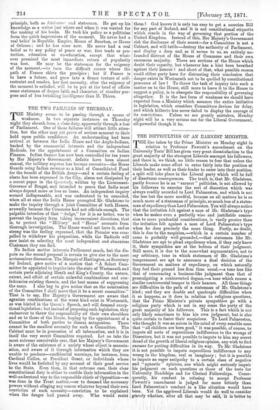THE TWO FAILURES OF THURSDAY. T HE Ministry seems to be
passing through a spasm of weakness. In two separate instances on Thursday night they shrank from a clear duty, apparently through a fear of Parliament. One of these failures will attract little atten- tion, but the other may yet prove of serious moment to their hold upon public confidence. An understanding had been arrived at between the India House and the Anglo-Indians, backed by the commercial interests and the independent Radicals, for the appointment of a Committee on Indian Finance. Indian finance has now been controlled for ten years by Her Majesty's Government, deficits have been almost annual, the military expense has become excessive—the Horse Guards using Indian revenue as a kind of Consolidated Fund for the benefit of the British Army—and a certain feeling of alarm has been expressed in the City, alarm not dissipated by a recent paper in the Quarterly, written by the Lieutenant- Governor of Bengal, and intended to prove that India must always depend more or less on loans. An independent inquiry seemed indispensable, and was understood to be conceded, when all at once the India House prompted Mr. Gladstone to make the inquiry through a joint Committee of both Houses, avowedly because the Commons had not officials enough. The palpable intention of that " dodge," for it is no better, was to prevent the inquiry from taking inconvenient directions, that is, to protect the " Military" and " Home" accounts from thorough investigation, The House would not have it, and so strong was the feeling expressed, that the Premier was com- pelled to withdraw his proposition, while the Radicals will now insist on selecting the most independent and obnoxious Chairman they can find.
No Indian matter interests Parliament mach, but the dis- pute on the second proposal is Certain to give rise to the most acrimonious discussion. The Marquis of Hartington, as Secretary for Ireland, gave notice of a motion that "A Select Com- mittee be appointed to inquire into the state of Westmeath and certain parts adjoining Meath and King's County, the nature, extent, and effect of certain unlawful combinations and con- federacies existing therein, and the best means of suppressing the same. I also beg to give notice that on the nomination of the Committee I shall move that it be a secret committee." 'That is to say, Her Majesty's Government are aware that agrarian combinations of the worst kind exist in Westmeath, as was hinted in the Queen's Speech, and will demand excep- tional legislation; but instead of proposing such legislation, they endeavour to throw the responsibility off their own shoulders and on to those of the House, hoping by the appointment of a Committee of both parties to disarm antagonism. There cannot be the smallest necessity for such a Committee. The Cabinet must be in possession of all information, and it is in itself the very secret Committee required. Let us take the most extreme conceivable case, that her Majesty's Government is aware of the existence of a society whose object is assassin- ation, and aware of it through information which they are unable to produce—confidential warnings, for instance, from Cardinal Cullen, or President Grant, or individuals whose lives would be forfeited by any account of their good service to the State. Even then, in that extreme case, their clear constitutional duty is either to confide their information in the well-understood way to the responsible chiefs of Opposition—as was done in the Trent matter,—or to demand the necessary powers without alleging any reason whatever beyond their own conviction of such necessity—conviction to be explained when the danger had passed away. Who would resist them ? God knows it is only too easy to get a coercion Bill for any part of Ireland, and it is not constitutional etiquette which stands in the way of governing that portion of the United Kingdom. Instead of this, Her Majesty's Government risk the disclosure of their secret—for a Committee is not a Cabinet, and will tattle—destroy the authority of Parliament, and display a deep and, as it seems to us, an entirely un- founded distrust of the House of Commons and their own enormous majority. There are sections of the House which doubt their capacity, but whenever has a hint been breathed against their honour ? and short of that, what possible reason could either party have for distrusting their conclusion that danger exists in Westmeath not to be quelled by constitutional processes of law ? To throw the task of inquiry into such a matter on to the House, still more to leave it to the House to suggest a policy, is to abnegate the responsibility of governing altogether. It is the last form of weakness we should have expected from a Ministry which assumes the entire initiative in legislation, which considers Committees devices for delay, and which hitherto has never failed to display the courage of its convictions. Unless we are greatly mistaken, Monday night will be a very serious one for the Liberal Government, all-powerful though it be.


































 Previous page
Previous page